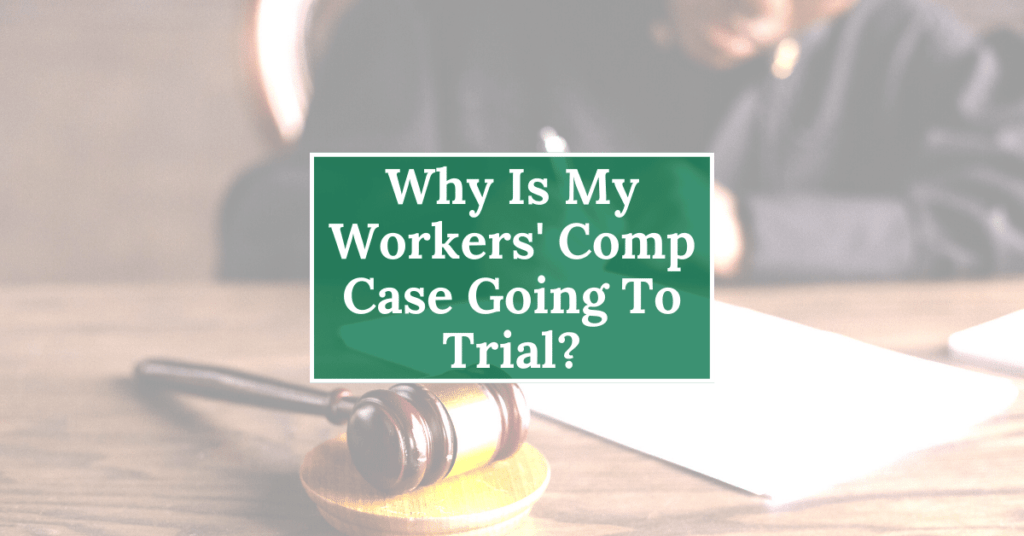Why Is My Workers' Comp Case Going To Trial
 Why Is My Workers' Comp Case Going To Trial
Why Is My Workers' Comp Case Going To Trial Why Is My Workers' Comp Case Going to Trial?
If you’ve recently received a workers’ compensation claim for an on-the-job injury, you may be wondering why it is going to trial. After all, you thought the process was supposed to be straightforward, and you’re now dealing with the potential for a trial and the stress and hassle that come with it. You’re not alone.
Millions of Americans each year are involved in workers’ compensation claims, and many of them experience difficulties that end in a trial. It’s important to understand why this can happen so that you know what to expect and how to proceed.
Reasons for a Workers' Comp Case Going to Trial
In general, workers’ compensation disputes are resolved without the need for a trial. The goal is typically to avoid costly litigation and come to an agreement that is satisfactory to all parties. However, this isn’t always possible.
There are several specific reasons why a workers' comp case may go to trial. These include:
- The insurance company disputes the claim: It is not uncommon for an employer’s insurance carrier to disagree that a particular injury is covered by workers’ compensation laws. In some cases, the insurance company may reject the claim outright. In other cases, the insurance company may agree to pay some of the compensation, but dispute other elements of the claim.
- The insurance company disputes the amount of coverage: If an insurance company agrees that the injury is covered, they may still challenge the amount of coverage. They may attempt to prove that the injury is less serious than it appears, or they may reduce the amount of compensation owed on the basis of pre-existing conditions.
- The worker’s representative disagrees with the insurance company: In some cases, a workers’ representative—such as a lawyer—may disagree with the insurance company’s assessment of the claim. In these cases, the worker’s representative may choose to go to trial in order to argue for a larger settlement.
- The insurance company or worker’s representative believe the other party is not negotiating in good faith: In some cases, one party may believe that the other party is not negotiating in good faith. This can often occur after extended negotiations, and one party may believe that the other is not interested in a fair outcome.
The list above is not exhaustive, but these are some of the most common reasons why a workers’ compensations claim may go to trial. If you believe that any of these reasons may be applicable in your case, it is important to consult with an experienced workers’ compensation attorney to help you understand your rights.
Should I File a Lawsuit if My Workers' Comp Case Goes to Trial?
If your case goes to trial, you may wonder whether or not you should pursue a lawsuit. Generally speaking, this is not recommended. While a lawsuit could result in a larger settlement or award, it would also drastically increase the cost of resolving the case.
In most cases, the cost and stress of a lawsuit far outweigh any potential benefit. The workers’ compensation process is designed to resolve disputes without the need for a trial, and so any effort to pursue a lawsuit should be carefully weighed against the potential cost and inconvenience.
What Should I Expect if My Workers' Comp Case Goes to Trial?
If your case does go to trial, it is important to understand what to expect. Generally speaking, the trial will be conducted like any other court proceeding. Witnesses may be called to testify and evidence may be presented. The outcome will be decided by an administrative law judge who will consider the testimony and evidence supplied by both parties.
Once the administrative law judge renders a decision, both parties have the option to appeal the decision. If an appeal is made, the case will be reviewed by a higher court. It is important to understand, however, that appeals are rarely successful and are often not worth the added expense.
What Are My Rights if My Workers' Comp Case Goes to Trial?
If your case goes to trial, it is important to understand your rights. As a worker, you have the right to legal representation. You also have the right to have witnesses testify on your behalf, and to present evidence and expert testimony if necessary.
In addition, you have the right to expect a fair outcome. The administrative law judge who hears the case must consider all the evidence and testimony and make a decision based on the established legal standards. Your case must not be decided arbitrarily or based on bias.
What Is the Best Way to Prepare for My Workers' Comp Trial?
If your workers' comp case is going to trial, it is important to be prepared. The best way to do this is to consult with an experienced workers’ compensation lawyer. An attorney will help to ensure that you understand the process and that all of your rights are protected.
It is also important to remain organized and informed. Gather all of the documents related to your injury, such as medical records, insurance papers, and wage statements. You should also prepare a list of any witnesses who can testify on your behalf and create a timeline of the events leading up to your injury.
Conclusion
If your workers' compensation case is going to trial, it can be a stressful and overwhelming experience. It is important to understand why the case is going to trial and to know what to expect. It is also critical to have an experienced workers' comp attorney on your side to ensure that your rights are protected and that you have the best possible chance of success.
Post a Comment for "Why Is My Workers' Comp Case Going To Trial"